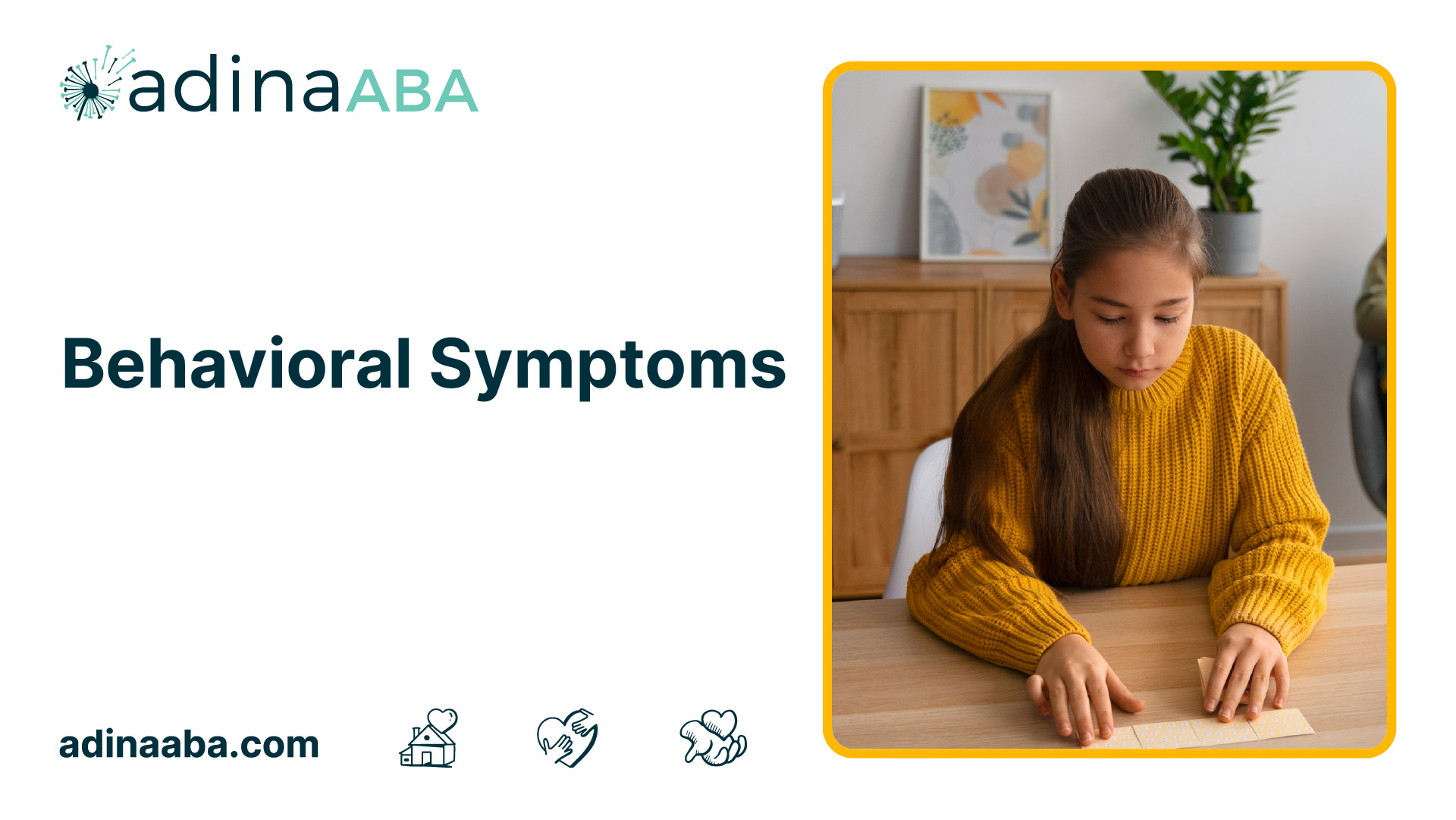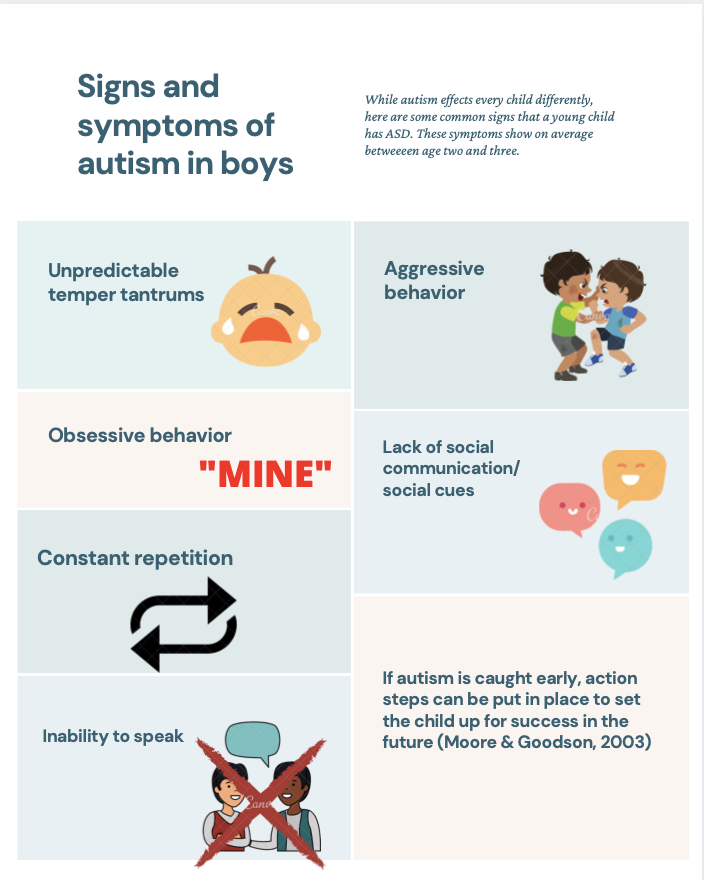Key Symptoms And Signs to Identify in People With Behavioral Autism
When you encounter someone with behavioral autism, recognizing key symptoms and signs is important. You may notice difficulties in social interactions and communication, in addition to a strong need for routines. Furthermore, sensory sensitivities can result in overwhelming experiences. Comprehending these attributes can improve your assistance and treatments, however there's more to reveal concerning exactly how these habits manifest in daily circumstances. Allow's explore what these indicators really appear like.
Difficulties in Social Communications
When you connect with somebody on the autism spectrum, you could see they have problem with social cues and communication. These obstacles can make social interactions feel frustrating for them. You might see them preventing eye call or standing too close or also far away throughout conversations, which can create misunderstandings. They could not notice body movement or faces, making it harder for them to gauge just how others are feeling.
When they do involve, they might speak about their interests in great information without noticing if you're interested. Understanding these difficulties can help you come close to communications with compassion and persistence, fostering a much more comfortable setting for both of you.
Difficulty With Verbal and Non-Verbal Interaction

Non-verbal communication can be much more difficult. You could see an absence of eye call or minimal use of motions, which can make communications feel unpleasant. Face expressions may not constantly align with the conversation, resulting in confusion regarding their feelings. Recognizing these signs is important, as it helps you much better assistance and involve with individuals on the autism range. By comprehending their interaction obstacles, you can foster a lot more meaningful links and offer an extra helpful atmosphere.
Recurring Actions and Routines
Communication difficulties usually go along with various other signs of autism, such as repetitive habits and a strong choice for routines. You could observe that people with autism typically participate in details, repeated actions, like hand-flapping, rocking, or duplicating expressions. These actions can give comfort and a feeling of control in a frequently frustrating globe.
When they follow an organized routine,Regimens are similarly important; lots of people flourish. You may discover that modifications to these routines can result in significant distress. If they have an everyday routine of eating morning meal at a particular time or following a certain course to school, any kind of disruption can create anxiety.
Identifying these patterns aids you comprehend their habits and offer support. By suiting their need for regular and allowing repeated activities, you can produce an extra comfy atmosphere that alleviates their obstacles.
Sensory Sensitivities

Typical Sensory Triggers
Sensory sensitivities can considerably influence day-to-day live for people with autism, as particular stimuli often trigger frustrating responses. Typical sensory triggers consist of loud noises, bright lights, and solid scents. You could discover that unexpected sounds, like alarm systems or sirens, cause stress and anxiety or distress. In a similar way, fluorescent illumination in shops can really feel extreme and unpleasant. Appearances can also play a significant role; rough textiles or particular food textures may be excruciating for you. In addition, crowded areas can bewilder your senses, making it tough to concentrate or kick back. Recognizing these triggers can help you handle your atmosphere better. By understanding what affects you, you can take steps to reduce discomfort and boost your everyday experiences.
Behavioral Reactions Explained
Recognizing your behavioral responses to sensory sensitivities is essential, as they commonly disclose just how you interact with the globe. You may notice that certain noises, lights, or structures bewilder you, causing anxiousness or pain. When confronted with these stimulations, you could take out, cover your ears, or perhaps respond boldy. These feedbacks aren't just quirks; they're your way of handling overstimulation. You may additionally find yourself looking for certain sensory experiences, like deep stress or silent environments, to help ground on your own. Recognizing these patterns assists you comprehend your requirements better and can assist how you communicate them to others. By acknowledging your sensory sensitivities, you can function in the direction of creating an environment that feels extra comfortable and convenient for you.
Coping Strategies Introduction
Identifying your sensory sensitivities is simply the very first step; now it's time to discover coping techniques that can assist you take care of those experiences properly. Begin by developing a sensory toolkit tailored to your needs. This might include noise-canceling headphones, fidget playthings, or calming scents. Establishing a structured regimen can also supply predictability, minimizing anxiety around sensory overload. When you really feel overloaded, take breaks in a silent area to collect yourself. Exercising mindfulness techniques such as deep breathing can help ground you in the minute. Additionally, communicate your requirements with those around you; having helpful good friends and family members can make a massive difference. Keep in mind, discovering what works finest for you might require time, so be open and patient to trying brand-new methods.
Limited Interests and Emphasis
While lots of individuals establish a vast array of rate of interests, those with autism commonly demonstrate limited passions and an extreme focus on details topics. You could discover that somebody with autism can spend hours diving right into their favored subject, whether it's a certain type of train, a details motion picture, or a scientific idea. This extreme focus isn't just a pastime; it can become a central part of their identification and social communications.
You may locate that discussions revolve around these passions, and they might have a hard time to engage in wider subjects. By understanding and recognizing these restricted interests, you can foster a helpful setting where they feel valued and comprehended, enabling for more purposeful connections and interactions.
Psychological Regulation Problems
Individuals with autism commonly deal with obstacles in psychological law, which can be affected by their intense concentrate on particular rate of interests. You might see that when a person is deeply taken part in a recommended task, they can experience strong feelings, whether exhilaration or disappointment. When things do not go as intended., this strength in some cases makes it hard for them to shift gears or manage their sensations - Aba Therapist.

Irregularity in Developmental Milestones
When it comes to developing turning points, you'll notice that individuals with autism usually reveal a wide array of irregularity. You might see a kid excel in language abilities but struggle with social communications.
It's important to acknowledge that each individual's journey is distinct. Some might establish complex abilities early, only to face challenges in the future. Others may take longer to achieve fundamental turning points yet after that thrive in specific areas. Observing these patterns can assist you comprehend their strengths and needs much better.
Frequently Asked Inquiries
Exactly How Is Autism Identified in Children and Grownups?
To diagnose autism in grownups and children, professionals review habits, interaction abilities, and social interactions. They frequently use standardized tests, interviews, and monitorings to figure out if a specific satisfies the requirements for autism spectrum problem.
Are There Various Sorts Of Autism Range Disorders?
Yes, there are different types of autism range disorders, consisting of Asperger's disorder and prevalent developing disorder-not or else defined. Each kind varies in extent and features, so recognizing these differences can assist you better support people with autism.
What Treatments Are Effective for People With Autism?
When considering effective therapies for people with autism, you'll find alternatives like Applied Habits Evaluation, speech treatment, and work therapy. Each approach can help enhance communication, social skills, and daily functioning customized to private needs.
Can Individuals With Autism Lead Independent Lives?
Yes, individuals with autism can lead independent lives. With the click here ideal support, skills training, and sources, you can assist them create self-sufficiency, handle daily tasks, and grow in different settings, fostering their independence.
How Can Households Assistance Loved Ones With Autism?
You can sustain your loved ones with autism by creating a structured setting, urging their passions, exercising persistence, promoting interaction, and promoting social abilities. Commemorate their accomplishments, no matter how little, and build an encouraging area.
Although numerous individuals on the autism spectrum can recognize and utilize language, they often face considerable challenges with both non-verbal and spoken communication. Recognizing these indicators is important, as it helps you far better assistance and involve with people on the autism range. You could observe that individuals with autism usually involve in specific, repetitive activities, like hand-flapping, rocking, or duplicating phrases.Sensory level of sensitivities can substantially impact everyday life for people with autism, as specific stimulations commonly trigger frustrating reactions.When it comes to developmental turning points, you'll notice that individuals with autism frequently show a large range of irregularity.